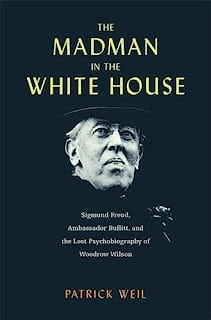When I started graduate school at Princeton University in 1972, one could not avoid learning the infamous story of the ill-fated early 20th-century conflict between the then University President Woodrow Wilson and the then Graduate School Dean Andrew Fleming West over the location of the Graduate College. Dean West famously won the battle. The Graduate College (now affectionately down as « the GC ») was built a long walk away from the center of campus (on the hill where George Washington had watched the Battle of Princeton on January 3, 1777). Woodrow Wilson angrily left Princeton to run for Governor of New Jersey in 1910 and then President of the United States in 1912. As President from 1913 to 1921, his rigid, uncompromising personality replicated his conflict with West – most famously in his conflict with Senator Henry Cabot Lodge and the Republican Senate leading to his defeat in the vote on the Versailles Treaty and the League of Nations. (Wilson also opposed women’s suffrage and labor unions and regarded Robert E. Lee as his greatest hero.)
Wilson’s conflict with West about where to build the Graduate College was just part of a pattern that characterized his failed tenure as Princeton’s President and would anticipate his failures as U.S. President. As someone said to me once, « Wilson was wrong even when he was right. » Wilson’s rights and wrongs remain ineradicably part of Princeton’s legacy, as they continue to characterize aspects of the ambiguous American attitude toward democracy at home and global responsibilities abroad.
In 1972, just when I was starting graduate study in political philosophy, Wilson’s sad story acquired additional salience with the publication of James Barber’s The Presidential Character: Predicting Performance in the White House, in which Barber tried to typify modern American Presidents, according to four psycho-political categories: active-positive, active-negative, passive-positive, and passive-negative. Barber tried to argue that the future performance of a president could be anticipated by looking at the aspects of his personality that put him in one of those categories. Whatever one thought of Barber at the time, it seemed that political psychology was becoming a new « modern » way of dealing with traditional questions of leadership, which political theory had long sought to address in moral language.
Political psychology of this sort is intrinsically interesting and possibly of some practical use. It is also somewhat problematic for at least two reasons. The first is that, even when Freudianism was at its most prominent, there were already several competing psychological schools for an author to choose among (and for the reader to agree or disagree with). The second is the questionable procedure of psychological analysis conducted from a distance, rather than in person. These problems lurk in the background of any psychological study of any past or present political figure – including Barber’s 1972 effort and the most famous (or infamous) of all such efforts, Thomas Woodrow Wilson: Twenty-eighth President of the United States: A Psychological Study, by Sigmund Freud and William C. Bullitt (Houghton, Mifflin, 1966).
Now with Wilson himself again undergoing reevaluation, Distinguished Fellow at Yale Patrick Weil has reopened that old wound with The Madman in the White House: Signmund Freud, Ambassador Bullitt, and the Lost Psychobiography of Woodrow Wilson (Harvard U. Pr. 2023). Obviously, Weil’s book offers yet another critical account of Woodrow Wilson. As importantly, it is, in effect, a biography of the curious figure of William C. Bullitt, journalist turned diplomat, who served with Wilson at the Paris Peace Conference, then turned against the Treaty, making him « a hero both for Wilson’s Republican opponents and the liberals who had once supported Wilson. » Weil recounts Bulitt’s complicated personal life, which led him to become Freud’s patient and later to invite Freud’s collaboration in exposing Wilson’s personality flaws. But Bullitt’s subsequent diplomatic career in the FDR administration as the first U.S. ambassador to the Soviet Union and then ambassador to France (where he played a noteworthy role in the early part of World War II), made him cautious about publishing the book, which he finally did in December 1966, just months before his own death (and decades after Freud’s). As Weil notes, « publishing the Wilson manuscript could not harm a career that was finished. »
Bullitt’s career constitutes a story all its own, which Weil recounts in considerable detail – both Bullitt’s political and diplomatic accomplishments and his own personal problems, which were what led him to Frued. Weil intriguingly retells the tragic story of the Treaty of Versailles and the failed battle for its ratification – both from Bullitt’s perspective, highlighting John Maynard Keynes characterization of Wilson as « a blind and deaf Don Quixote, » whose rigid, uncompromising personality was a primary cause of the treaty’s flaws and of its failure. And, inevitably, he devotes a full chapter to Wilson’s « Princeton Nightmares. » He recounts a revealing conversation Wilson supposedly had with Edward House at dinner in December 1913 « that his Princeton experience hung over him sometimes like a nightmare; that he had wonderful success there, and all at once conditions changed and the troubles, of which everyone knows, were brought about. He seems to fear that such a dénouement might occur again. »
Wilson’s own apparent sensibiity on this subject reminds me of the increasingly conventional wisdom when I was a 1970s grad student that Wilson’s failure as President of the United States replicated his failure as President of Princeton, and that the only reason something analogous didn’t happen while he was Governor was that he ran for president so soon after becoming Governor!
Apparently, Bullitt was « the only American, » in Freud’s view, « who understands something about Europe and wants to do something for Europe. » How much Freud had actually contributed to Bullitt’s book and how fully Bullitt had integrated Freud’s psychoanalytic theory into his own interpretations would, however, be subjected to some debate when Bullitt later tried to publish the Wilson book. Anna Freud unsuccessfully tried to force Bullit to accept some revisions. She told Erik Erikson, the American psychoanalyst who wrote a critical review in 1967 in The New York Review of Books, that her father was responsible only for an introduction he had written; and she told Paul Roazen, an American political scientist and historian of psychoanalysis, that she found it « very disturbing. » According to Weil, Anna « rejected the book only after Bullitt opposed her corrections and upon witnessing its bad reception among her colleagues. » The book’s immediate impact might be gauged from the last message former Vice President Richard Nixon had sent to the dying Bullitt: « Congratulations incidentally on driving the liberal establishment out of their minds with your Wilson. »
Bullitt himself had a somewhat less than attractive side to his personality (increasingly evident in his later years), and his and Freud’s analysis of Wilson is obviously tainted by their political biases, as well as by the diminished salience of Freudian analysis and concepts in an increasingly post-Freudian world. That said, to the extent that psychoanalytic theory retains any meta-explanatory value, Freud and Bullitt’s book deserves continued consideration. It was Weil notes, « the first attempt to apply psychoanalytic theory to a political leader, and, as such brought about interpretive innovations. » Weil acknowledges that the book « was vindictive. » and he believes « their interpretation goes too far. » Weil’s « own view is that Wilson’s neurosis limited his rational judgment at key moments, with profound reverberations world history, but he was not a constant slave to his phobias and fixations. » Yet Weil believes that « something high original » was accomplished « in drawing a psychological portrait of a world leader on the basis of inner-circle interviews and archival documents. »
In recovering Bullitt’s manuscript and retelling its story, Weil has highlighted again the enormously important impact of personality factors and flaws in the lives and careers of political actors and in our appreciation of their accomplishments and (as in Wilson’s case) their catastrophic failures.
« Today, » Weil concludes, « the question posed by Freud and Bullitt is as acute as it has ever been. By what means shall democracies prevent those who cannot be trusted with power from obtaining it – and using it to the detriment of their constituents, the wider world order, and democracy itself? The time has come to reopen this conversation. »




